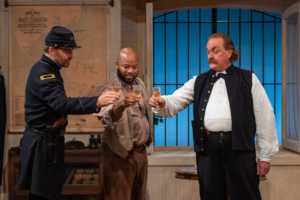Review: BEN BUTLER: Gloucester General's Pivotal Role in the Civil War

Written by Richard Strand, Directed by Joseph Discher; Scenic Design, Greg Trochlil; Lighting Design, Russ Swift; Costume Design, Chelsea Kerl; Props Design, Lauren Corcuera; Sound Design, Joseph Discher; Stage Manager, Jenna Worden
CAST (in order of appearance): Ames Adamson, Doug Bowen-Flynn, Shane Taylor, David DeBeck
Performances through August 25 at Gloucester Stage Company, 267 East Main Street, Gloucester, MA; Box Office 978-281-4433 or www.gloucesterstage.com
Gloucester Stage Company presents the Boston area premiere of Richard Strand's Ben Butler, a Union army general who was a settler of Gloucester's Bayview neighborhood, a presidential candidate, and the 33rd Governor of Massachusetts. Those achievements came after he retired from the military, where he forged a reputation as a champion of the causes of labor, abolition of slavery, and naturalized citizens. In the play, set in the middle of the Civil War in 1861, Butler faces a moral dilemma, forced to choose between adhering strictly to the law or daring to make a bold move that holds the promise of changing history.
Only recently ensconced in his position as commander of Fort Monroe in Virginia, Butler (Ames Adamson) must make a high stakes decision about how to deal with three escaped slaves who show up seeking sanctuary at the Union-held outpost, just as the Commonwealth has seceded to join the Confederacy. With his West Point-educated aide-de-camp, Lieutenant Kelly (Doug Bowen-Flynn), standing by, Butler agrees to meet with Shepard Mallory (Shane Taylor), despite his aversion to the latter's use of the term "demands," and the two commence an intense battle of wits to find a solution to their shared conundrum. The General suggests that Mallory and his fellow runaway slaves "escape" from the fort and continue north, to anywhere they want to go, but Mallory refuses, averring that they will not be safe.
Butler and Kelly are frustrated with and challenged by the well-spoken Mallory, a man who by his own admission says that everybody hates him. However, his persistence seems to wear down the resistance of his hosts, leading to Butler's dilemma when an emissary from the Confederacy is dispatched to collect their "property." Major John B. Cary (David DeBeck) is, by definition, the enemy, and does nothing to endear himself to Butler when he produces a list of demands from the inner pocket of his tunic. During their negotiations, the wheels are turning in Butler's lawyer's brain, and his brilliant gamesmanship paints his foe into a corner. With all the bluster he can muster, Cary tries to recover, but, not only is he in enemy territory, he is out of his league. Adamson and DeBeck combine to make their verbal duel one of the highlights of the play.
Speaking of bluster, Butler possesses his share of it, too, but Adamson shows it combined with a thoughtful facade, telegraphing when he is about to devise a solution to his problem. It is one of many ways that the actor inhabits his character, allowing us to accept him as the General and to suspend disbelief from the opening scene. In fact, each of the members of the cast achieves this verisimilitude in their performances, aided by Joseph Discher's seamless direction and authentic design elements (Greg Trochlil, scenic; Russ Swift, lighting; Chelsea Kerl, costume; Lauren Corcuera, props; Discher, sound). Bowen-Flynn does a masterful tightrope walk as the lower-rank officer who delicately finds ways to obey, as well as dispute, his commander.
Strand has created a complex character in Mallory, and Taylor gives a fully-realized portrayal in the role. He skillfully toggles back and forth within the duality of the slave who is intelligent, the desperate man who makes demands, and the supposedly hated man who can be quite likable. Although he needs Butler to provide him sanctuary, Mallory is not afraid to argue his case and push the envelope, which Taylor does with conviction. His face and his bearing show that he is fighting not only for himself, but for the greater good of other runaways and freed slaves in the future. Mallory is only one man, but Taylor makes him a symbol.
Ben Butler handles its serious subject matter with a light hand, employing a significant dose of humor on its journey to a rewarding denouement. Each of the characters has human foibles that allow us to have some fun at their expense, although they usually recognize their own quirks somewhere along the way. It contributes to the feeling of authenticity that permeates the production and suggests that men in positions of power can do the right thing if they stop to listen and think. In 1861, General Benjamin Butler listened to Shepard Mallory and figured out how to do the right thing. In 2019, that's a potent message to take home from the theater.
Photo credit: Jason Grow (Doug Bowen-Flynn, Shane Taylor, Ames Adamson)
Reader Reviews

Videos

